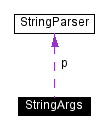
#include <stringparser.h>
Collaboration diagram for StringArgs:

An argument of this type is good for a function which constructs an object from a string specification. If you're starting with a simple string, you can use the string constructor below; otherwise (e.g. if starting with a pre-segmented vector of strings) use the iterator-based constructor. An object from this class can be passed around as a reference argument to various other classes, each of whom can consume some of the tokens until all are gone.
To consume a token, supply to next() a default value of the type you would like returned; this value will be returned if no arguments remain. Even if no default is meaningful, supply one anyway but first check that the arglist is not empty(), which will ensure that the default is not used.
Definition at line 158 of file stringparser.h.
Public Methods | |
| StringArgs (const StringParser &parser, StringParser::argptr b, StringParser::argptr e) | |
| StringArgs (const StringParser &parser, const string &s) | |
| StringArgs (const StringArgs &other) | |
| Copy constructor. | |
| bool | empty () const |
| Returns true if no arguments remain. | |
| bool | oneremaining () const |
| Returns true if exactly one argument remains. | |
| template<class T> T | top (const T &default_val) const |
| Family of parses based on type of the given default. | |
| void | skip () |
| Consumes the current argument. | |
| template<class T> T | next (const T &default_val) |
| Same as top() but consumes the current argument. | |
| template<class T> T * | next (const T &default_val, T *&ptr) |
| Version returning a pointer instead of a value. | |
| template<class T> bool | nextis (const T &test_val) |
| Consumes only if equal to given value, and returns true if so. | |
| template<class T> bool | lookaheadone (const T &test_val) const |
| Returns true if the next argument after this one is equal the given value; rarely needed. | |
| StringArgs | recursiveparser () |
| Consumes the current argument as a string and returns a new parser parsing the substructure of it, i.e. | |
| StringArgs | recursiveparser (const string s) const |
| Returns a new parser parsing the given string. | |
| string | stringrep () const |
| Returns a string representation of the remaining arguments. | |
Public Attributes | |
| const StringParser & | p |
| Provided as a public service to those needing a parser; avoid if possible. | |
|
|
Consumes the current argument as a string and returns a new parser parsing the substructure of it, i.e. arguments within that string. Definition at line 263 of file stringparser.h. References next(). Referenced by NamedValueGenerators::create(), and NeuralRegionMap::measure_stimulus_map(). |
|
||||||||||
|
Family of parses based on type of the given default. Returns the first argument (or the default) without modifying the state. Definition at line 199 of file stringparser.h. References empty(), and StringParser::parse(). Referenced by RetinalObjectStringArgs::vars(). |
 1.3-rc2
1.3-rc2